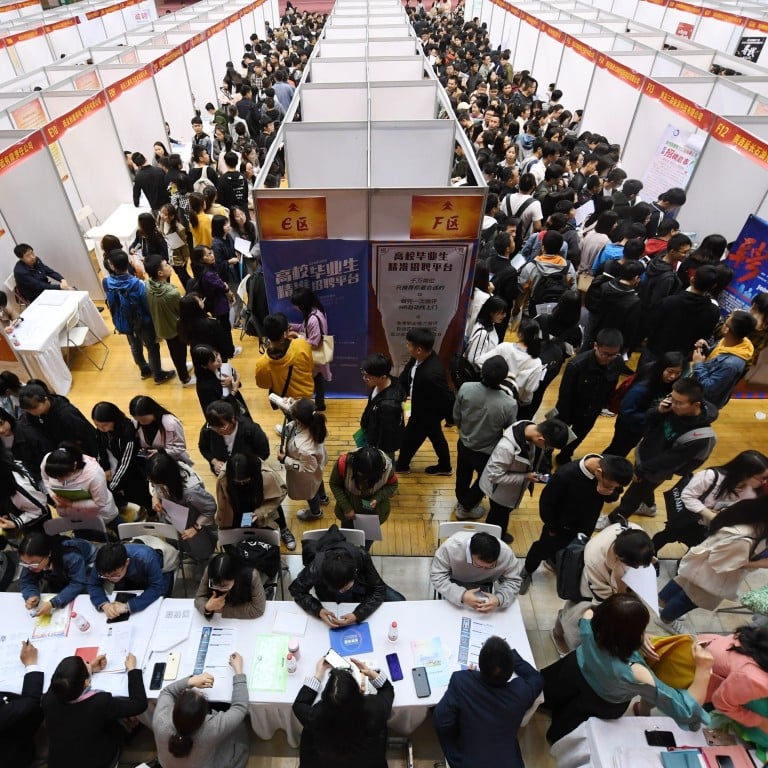
China graduates expect less pay as salary hopes turn ‘very rational’ and blue-collar jobs shine
- Findings from Chinese recruitment platform, based on surveys and résumés, show how China’s slow economic recovery is affecting job outlooks among those struggling most to find work
- ‘New first-tier cities’ such as Xian and Hefei are seeing some firms offer much larger salaries to lure talent and invigorate their local economies
The average monthly salary expectation of this year’s college graduates is 8,033 yuan (US$1,100) – or 100 yuan less than last year, according to a report released on Wednesday by the Liepin Big Data Research Institute, a Chinese recruitment platform, citing information from the résumés it handles.
Still, that is 8.3 per cent higher than the average salary expectation of 7,417 yuan in the pandemic-hit 2021.
Additionally, Liepin polled more than 4,000 members of the class of 2024 and found that they expect to make at least 8,000 yuan a month.
“Employment is tied to the overall market performance. In recent years, with the increase in uncertainties, the macroeconomy has been under pressure, but overall it is stable and improving,” the report said, adding that fresh graduates have “very rational” salary expectations.
It also said that newly emerged regional powerhouses – commonly known as “new first-tier cities” – have been offering relatively high salary increases to lure fresh graduates, in line with efforts to boost local economies nationwide.
Hefei, the capital of eastern Anhui province, for example, has devoted resources to EV, smart-home-appliance, integrated-circuit and electronic-information industries in recent years, as it aims to create a new national tech cluster.
Hefei and Xian, the capital of northwest Shaanxi province, have seen China’s two highest regional salary increase rates this year, respectively rising 29 and 27 per cent as the regions ramp up efforts to attract graduates and fill the growing needs of local industries.
Fresh graduates have tried to adapt by showing greater interest in new first-tier cities, as the proportion of their job applications to such cities has increased from 33 per cent in 2021 to 40 per cent this year. Meanwhile, the proportion of applications to the four traditional first-tier cities – Beijing, Shanghai, Guangzhou and Shenzhen – has dropped from 54 to 49 per cent in that span.
“College graduates are more open to moving to new first-tier cities because of the relatively low cost of living and future potential,” said Yuan Jianhua, the founder of recruitment consultancy Zxpai, who has 20 years of recruitment experience. “Although the average salaries in big cities are higher, graduates can’t really live with the same level of comfort after paying for rent” and other necessary expenses.
Six out of 10 members of next year’s graduating class also said they would settle for a blue-collar job if they cannot find a job they want. That percentage increased by 1.6 points compared with this year’s class. The top blue-collar job options are service work in food, drink, entertainment and other industries; delivery riders; gig drivers at ride-hailing platforms; and couriers. Others include more traditional manufacturing, agriculture and forestry workers.
China’s gig workers face lower pay, longer hours as Beijing praises Big Tech
Last month, a separate report jointly compiled by Jinan University and recruitment platform Zhaopin indicated that so-called flexible jobs accounted for almost 20 per cent of all position postings in the first quarter of this year – up from 14 per cent three years ago.
The proportion of new flexible-employment jobseekers also rose 4 percentage points to 23 per cent in that time.
“New flexible employment has become an important supplement to traditional employment, and has even occupied a dominant position in some industries,” the Zhaopin report said.
“But keep in mind,” noted Zxpai’s Yuan, “that those job postings are still targeting top students. More graduates will get basic support jobs at small local companies, and those positions are filled through internal referrals or local talent-market searches instead of aggregation platforms.”


